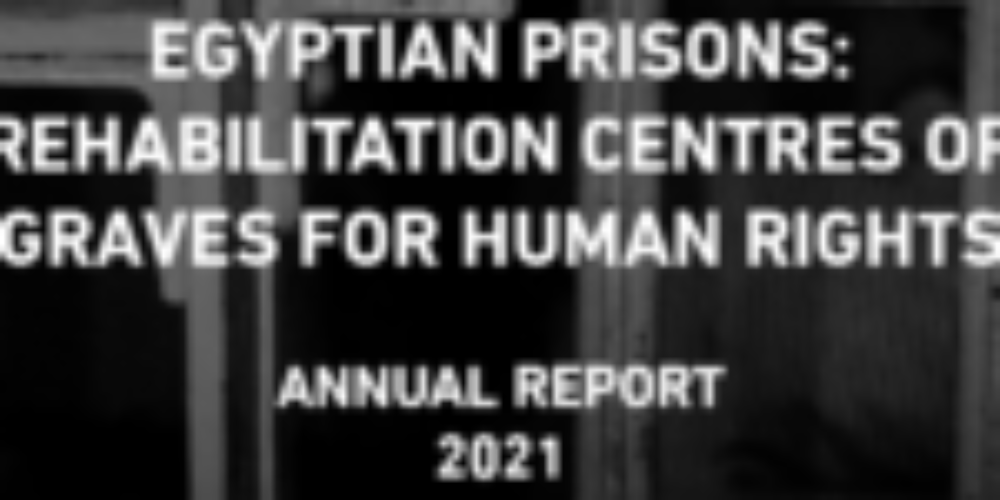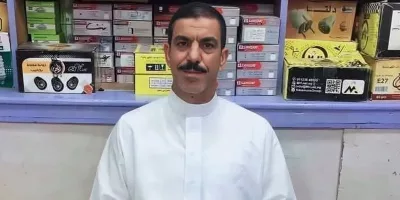The 2021 annual report by the Committee for Justice has shed light on the latest developments in Egypt’s human rights climate, above all was the abolition of the state of emergency and its replacement with repressive amendments that essentially established another state of “emergency” and a “state of exception” in the country. In the past year, authorities only changed the name of prisons, without a change in policy, and the newly declared “human rights strategy” was no more than propaganda by the Sisi government to ensure the continuation of international political and material support.
The annual report, part of the Detention Watch project, and titled: “Egyptian prisons: rehabilitation centres or graves for human rights”, outlined the verdicts issued against many human rights and political figures in Egypt, such as Zyad el-Elaimy, Hisham Fouad, Hussam Mounis, Abdel Moneim Aboul Fotouh and Mohammed el-Qassas.
Egyptian prisons and Covid-19 pandemic
In 2021, prisons and detention centers in Egypt witnessed more outbreaks of the Covid-19 pandemic, along with the complete absence of protective measures and treatment, putting the lives of many inmates in danger. Meanwhile, mistreatment and deliberate denial of health care prompted some victims to attempt suicide by self-immolation in the Tora Prisons Complex.
The year also witnessed the announcement of a campaign to vaccinate inmates, amid many complaints and problems related to the fairness of distribution and the right to access the vaccine. Additionally, the Ministry of Justice announced that it would implement new measures to enable the renewal of detention remotely, and the Ministry of Interior announced the completion of “the largest prison complex in Egypt”. The two developments herald further abuse by alienating inmates and cutting off communication with their families, especially those who are arbitrarily punished with denial of visits and health care.
Legalization of human rights violations
The year 2021 also witnessed the continuation of the alliance between the legislative and executive authorities to legalize violations of the civil and political rights of citizens. That included the issuance of the executive regulations of the law regulating the practice of civil society work 149/2019; Law 71/2021 criminalizing publishing and photographing court sessions; the amendment of the Law of the Supreme Constitutional Court 48/1979; Law 135/2021 allowing employees of the State Administrative Council who “harm national security” or are suspected of belonging to “terrorist” groups to be dismissed without discipline.
Mass death sentences
In the new year, Egyptian authorities carried out the death sentence against 18 defendants in two cases,12749/2013, known as “the case of storming the Kerdasa Police Station”, where the execution was carried out against 17 defendants on April 24 and 26, and case 106/2019 known as the “Attempt to Assassinate the Director of Alexandria Security”, where the authorities executed one defendant in July 2021. The Trial Watch team recorded that the litigation authorities issued death sentences against 49 people during 2021, in 11 cases, all of a political nature. The death sentence was also upheld against 41 defendants in three cases of a political nature.
Detailed documentation of violations
The report outlined the findings of documented violations, including 7,369 violations in 66 official and unofficial places of detention, distributed among 19 governorates throughout the country and including many types of violations. The documented violations were topped by arbitrary deprivation of liberty (4,885 cases), followed by enforced disappearance (1,668), poor conditions of detention (598), torture (156), and deaths in detention facilities (62).
Cairo witnessed the highest number of documented violations, with approximately 68 percent (5026/7369), followed by Sharqiya governorate, with about 16 percent (1225/7369) of the total.
In terms of the types of places of detention, out of the 1,144 violations which CFJ has been able to locate, central and public prisons topped the list with about 66 percent (763/1144), followed by police stations and headquarters with about 20 percent (229 /1144), then central security camps with 93 violations, and care homes for juvenile children with 31 violations.
Concerning the gender of victims, the report showed that male victims witnessed the highest number of violations, particularly arbitrary deprivation of liberty, amounting to 4,742 violations. Moreover, the incidents of the documented violations against females show that they were targeted with arbitrary deprivation of liberty and ill-treatment, either on the basis of activism or political orientation, or to pressure their children to surrender themselves with the logic of hostages and collective punishment.
CFJ also analyzed the data of the victims whose age group was determined. It found that the share of young people (18-34 years) of the documented violations was the highest, with 233 violations, distributed mainly between arbitrary deprivation of liberty and torture, followed by the middle-aged group (35 – 59 years), with 221 reported violations, most of which were enforced disappearance and deaths inside places of detention. There was also a notable increase in the number of violations against students, lawyers and human rights defenders during the reporting period.
The report also showed the verified violations against 495 victims in Egyptian prisons and detention centers. 591 violations against 187 victims were also verified, including the arbitrary arrest of citizens who have no political or ideological backgrounds, enforced disappearances, sexual assault and harassment of female victims.
Efforts to end injustice against victims
The report also pointed out that during 2021, the UN communication team submitted 98 complaints in favor of more than one hundred victims to the various United Nations mechanisms, 18 of which were legal opinions and communications. Example include: a legal opinion issued in January 2021 by the Working Group on Arbitrary Arrest regarding the arbitrary detention of Mohamed Adel, a legal opinion issued in May 2021 regarding the Al-Shuwaikh family, as well as a legal analysis on the NGOs Law 149/2019 and its violation of the principles of international law and political and civil rights. In August, a number of special rapporteurs contacted the Egyptian government regarding the case of Mahmoud Obada Abdel-Maqsoud Eid, who is facing a final arbitrary death sentence after being convicted of a trumped-up charge.
The location of the disappearance of seven victims of enforced disappearance was identified, and in five cases, the detainee was released or the family requested to close the complaint file. CFJ also participated in the global survey published by the UN Special Rapporteur on the situation of human rights defenders around the world, to gather information on human rights defenders detained for their activism, with the aim of presenting it to the United Nations General Assembly in October 2021. CFJ has submitted a list of 11 human rights defenders detained in Egypt, all of whom are currently in pretrial detention and accused of political charges related to the Anti-Terrorism Law.
Recommendations
CFJ also called for demonstrating the feasibility and seriousness of the “Egyptian strategy for human rights”, and stopping the continuous violations against citizens, while working towards restoring the independence of the Egyptian judiciary, and ending presidential appointments to enable an independent judicial body.
The organization also recommended suspending the implementation of death sentences against defendants in cases that lack fair trial principles, releasing prisoners of conscience and those who have exceeded their prison terms, and stopping the prosecution of members of civil society.
The report called for revealing the official Egyptian position regarding extrajudicial killings and prosecuting those involved in the crimes and operations that were proven by the leaked official documents to have taken place against civilians under the pretext of combating terrorism, and without observing due legal procedures.
Moreover, the organization called for obligating the human rights sector of the Ministry of Interior to open investigations into complaints and reports of victims of human rights violations, and to set an executive regulation that determines the timeframe for conducting investigations and informing the families of the victims of the results of the investigations.
The organization requested a review of the notorious laws that the Egyptian regime uses against citizens, especially its opponents, most notably the Emergency Law and its subsequent amendments 162/1956, the Anti-Terrorism Law 94/2015 and the amendments that followed it after the abolition of the state of emergency, the law regulating lists of terrorist entities and terrorists 8 /2015, the Protest Law 107/2013, Presidential Decision 136/2014 regarding the jurisdiction of the military judiciary over civilians and its amendments, the amendments to the Criminal Procedures Law 150/1950 that allow the extension of pretrial detention indefinitely, and the Law on Cases and Procedures for Appeals before the Court of Cassation promulgated by Law 57/1959.
CFJ also recommended implementing alternatives to pretrial detention, especially for the right of defendants in opinion cases, and reconsidering the decisions to include them on terrorism lists, which are considered an actual conviction for the accused before judicial verdicts.






